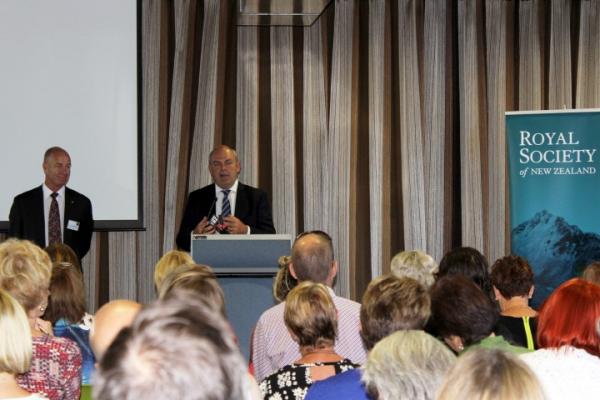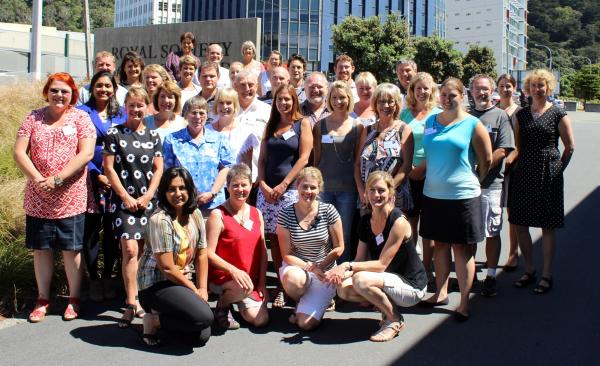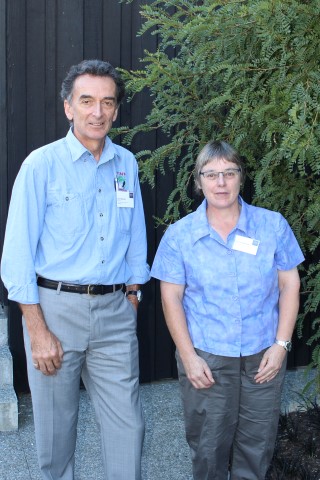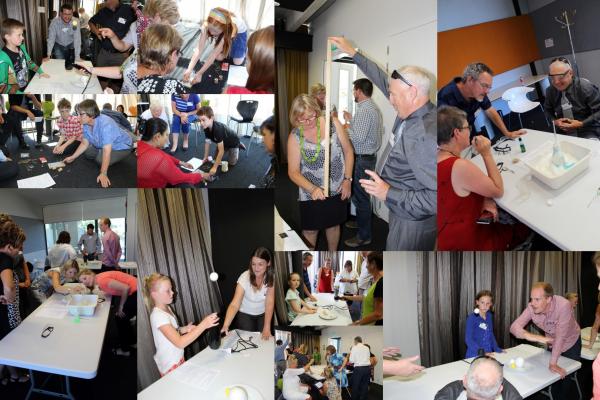News
Published 27 January 2015New programme aims to improve science learning in New Zealand

A new programme aimed at improving science learning and engagement in New Zealand is being launched in Wellington today.
The Science Teaching Leadership Programme will provide opportunities for teachers of science for year 1-10 students to develop their leadership skills and enhance the teaching of science within school communities.
Minister of Science and Innovation, Hon Steven Joyce, will launch the programme, which supports the Government’s strategic direction for science in society, as outlined in the document A Nation of Curious Minds -He Whenua Hihiri i te Mahara, released last year.
The Ministry of Business, Innovation and Employment will provide over $2 million dollars a year to the programme, which will be administered by the Royal Society of New Zealand.

Minister of Science and Innovation, Hon Steven Joyce, launching the Science Teaching Leadership Programme with Royal Society of New Zealand Chief Executive Dr Andrew Cleland
Royal Society of New Zealand Chief Executive Dr Andrew Cleland said the Society was pleased to be administering the programme as it aligns well with a key purpose of the Society: to promote science in New Zealand.
“The Science Teaching Leadership Programme builds on the Teacher Fellowship Scheme that the Society has been administering since 1994. Both the previous scheme and the new programme respond to concerns about student engagement in science,” Dr Cleland said.
“The previous scheme focussed on individual teachers – giving them hands-on science research experience in a host science organisation so they would have up-to-date knowledge to share with students and fellow teachers.
“The new programme takes this further, strengthening teachers’ leadership capability so they can confidently lead science in their schools with the backing and commitment from their principals.
“The final stage of the programme is for schools to develop partnerships with science organisations for the benefit of the wider school community.
“We hope the outcome of this programme will be students (and parents) across New Zealand who better understand how ‘science works’, have learned to think critically and can see the value that science brings to everyday life and decision making.”

Participant teachers in the Science Teaching Leadership Programme.
The launch represents the beginning of a two-year development journey for 35 participating schools and host science organisations from around New Zealand.
Participant teachers will spend two school terms working alongside scientists to gain a deeper understanding of New Zealand’s overarching science curriculum strand, called the Nature of Science, and undertaking leadership training.
On their return to school, the teachers will work with students, staff and their local community to enhance the quality of science teaching and learning in their school.
This will include building partnerships with science organisations.

Dave Banks, Nga Manu Nature Reserve; Dawn Hirschberg, Otaki College; at Science Teaching Leadership Programme Launch
One of the teachers starting the ogramme is Otaki College’s Dawn Hirschberg, who will be hosted at Nga Manu Nature Reserve in Waikanae. It is planned that an ongoing relationship between Otaki College and the reserve will result from Ms Hirschberg talking part in the programme.
For the research component of the programme, Ms Hirschberg will be working at the Nga Manu Nature Reserve for two terms, primarily monitoring the flow of water in and out of the reserve from the fresh water spring, through the ponds and out into the Kakariki Stream.
“Initially, I will be doing the monitoring but in the future, ideally, students would be coming down to the reserve and doing the monitoring.”
Ms Hirschberg said the prospect of leadership training was an aspect of the programme that appealed to her and the timing of the new programme was “perfect” as the science department at the college had begun looking around for how it could make links with local scientists and make better use of resources in the region.
Eager to get things underway, she and fellow staff members, including principal Andy Fraser, met with Nga Manu Nature Reserve Manager Dave Banks last week to discuss how they could work together.
Mr Banks said the meeting was a success. “The enthusiasm at the meeting blew me away. We were full of ideas and can’t wait to get started.”
Mr Banks said the coastal forest/swamp environment of the reserve provided an ideal environment for students to learn about many aspects of science from hydrology to insect life.
In addition, the new expressway being built through Paraparaumu and Waikanae would necessitate a realignment of the Kakariki steam and the restoration planting and new wetland that was to be created would all provide excellent subjects for students to study.
He was hopeful that a partnership with Otaki College would facilitate collaborations with other schools in the region.

As part of the launch, students from Hampton Hill School in Tawa demonstrated some simple science experiments with the teachers, principals and science organisation guests.
